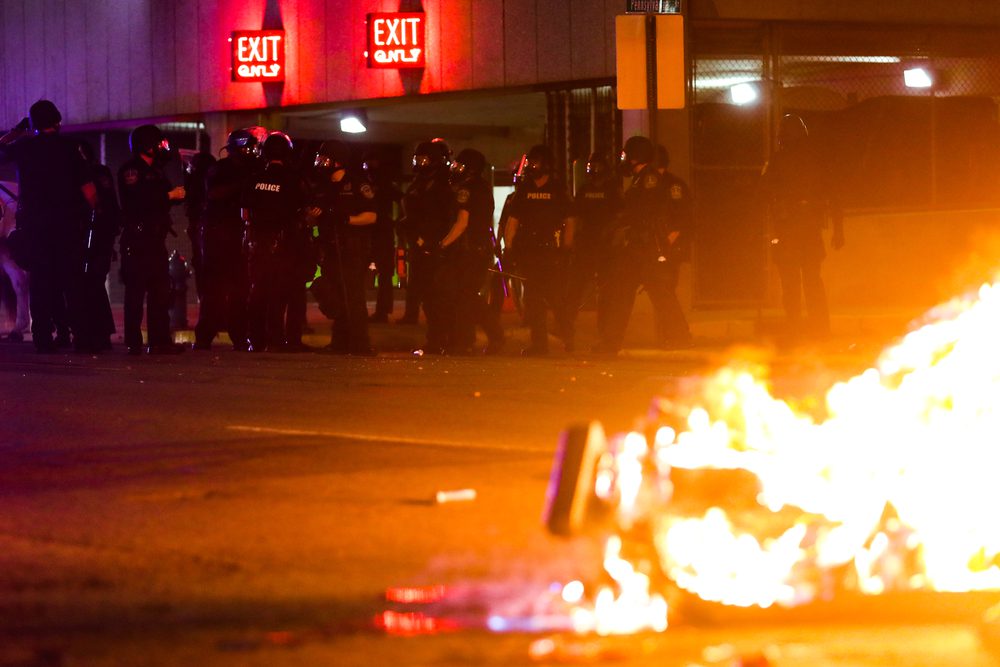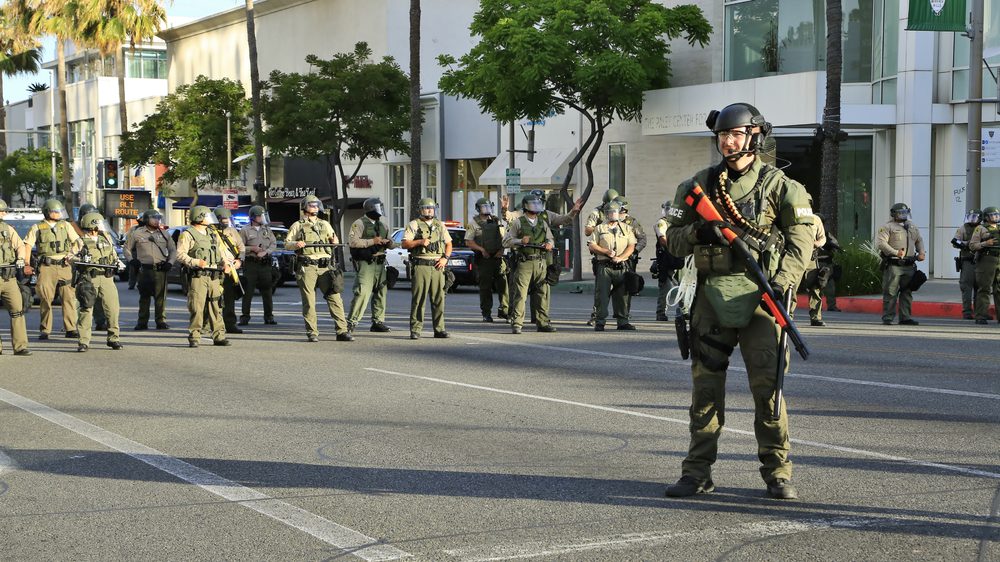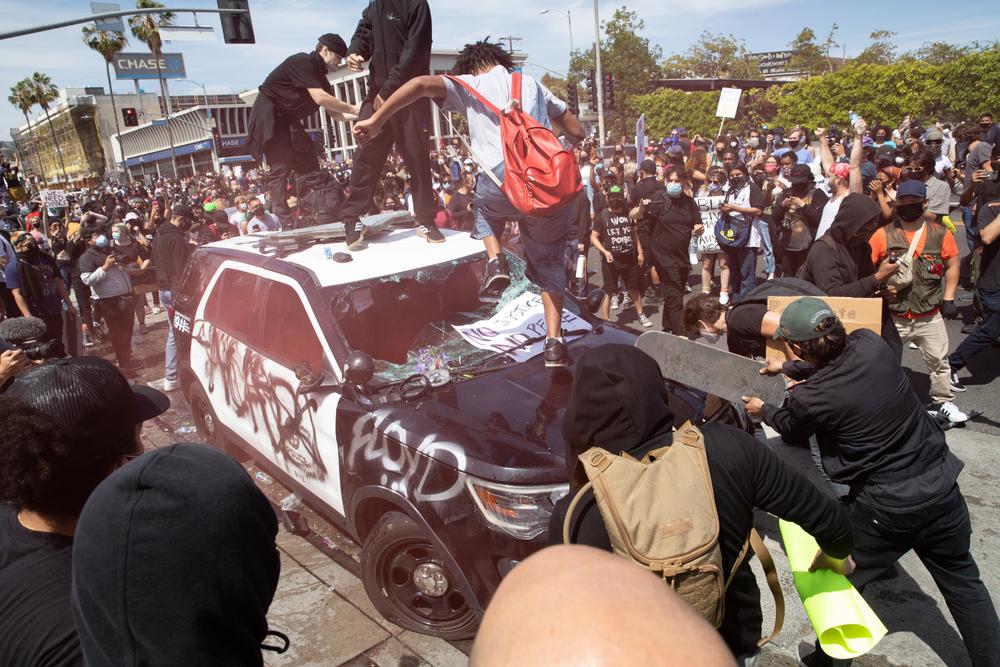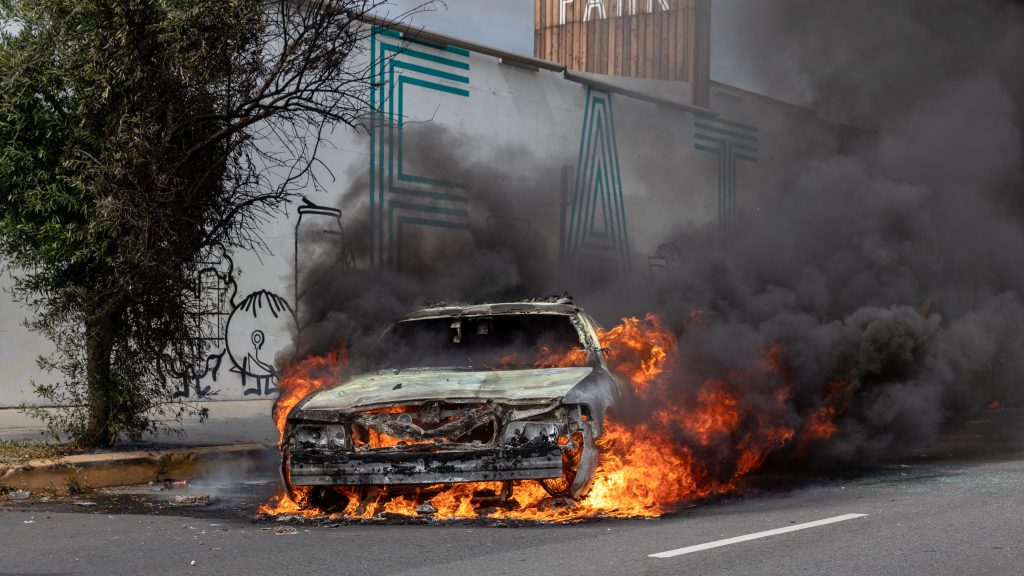So it’s been 30 years since the LA riots, and I keenly remember the events that took place leading up to and during, and after the riots. In 1992 I was working at KKBT, also known as The Beat. It was the top station in the country that everybody wanted to work at, and I had just been fired, and I distinctly remember how hypocritical and racist the station was.

Rappers were coming up to the station and being used for black culture to help positively manipulate ratings by the station, acting like they were their allies. I knew this firsthand because, during the weekend, memos would be passed around to staff asking them to lock their desks and valuables up because the rappers are coming up there during the weekend to do interviews and to be on the air.
The station was not into rappers, but the rappers were into the station. This was around the same time the Rodney King video came out and was shown so many times that it started to incite fear, frustration, and anger. There seemed to be a buildup right before Rodney King, and the not guilty verdicts were the straw that broke the camel’s back. Black people had been saying the police had been abusing their power for decades now; there was a video to prove it and it still wasn’t enough?
The late Rodney King, who died in a swimming pool accident 10 years ago (June 17, 2012), was seemingly under the impression that the riots were about him as he asked the public, “Can’t we all get along” during a press conference during the riots and it was obvious he was asked to do that. It did nothing to calm the anger and the frustration.
Mark Ridley Thomas said it best when he said the riots were not about Rodney King but what it was about black people who had been complaining about this kind of abuse to you for years. Now you have it on film, and you STILL don’t believe us?

I had only been in Los Angeles for two years in 1992 but I was working with people who were in the trenches during the unrest and I wanted to explore some aspects of the riots that took place as well as talk to a few people who were there in the midst of it. They’ll be a lot of coverage but from outside people with their perspectives that are often disconnected from blackness. Unfortunately, even some of the Black people reporting are far removed from what took place in 1992.
This is from people who were involved. When it comes to me, I can speak with a sense of pride at what was taking place as my days at KKBT, along with several other black men, were numbered, and I finally got to see firsthand how radio played a part in using rappers to make money and how it played a part in helping to settle unrest.
Seeing Black people have camaraderie was prideful in the LA Riots event. Unfortunately, it is usually like this when there is discord in the world, but to see Black people come together and fight for a cause is an amazing thing, and it’s also something that insights fear for those who are not black. So ways to shut down black camaraderie are pervasive.
To a large extent, the LA riots were about gaslighting the black community and the belief that everybody was on our team, but that was not the case as we found out afterward as we are still having many of the same types of problems today.
I worked with Isidra Person-Lynn, the news director back then at KACE, and while we were based in the hood, KJLH got a front and center seat of the riots. They were able to look at their window and see everything. Carl Nelson was doing a show called The Front Page back then and we got to talk to him and finally, A. Scott Galloway was a head writer at a black but white-owned industry trade called Urban Network. We were also working together, so we talked to him as well.
We asked Carl Nelson, who now works for Radio One in DC hosting a talk show on an all-talk AM, about the LA Riots and when did he realize 30 years ago that the situation was about to get worse after the not guilty verdicts were handed down …
“Well, actually, it all started because, you know, we did a show on the station called Front page, and it was an early morning show that Lee Michaels sort of created. I was doing the news, and Greg Mack was the morning man at the time.
So, Greg just said the people were calling up and, you know, wanted to talk about the verdict, but he wants to talk about who saw Prince or who saw Eddie Murphy at the club (doing a morning show). But the people they don’t want to talk about that they called to talk about Latasha Harlins and you know what’s going to happen. So, Greg just pointed at me, man you handle this. So that’s how it started
So, the conversation started in the morning. So, we knew people were upset because of Latasha Harlins. And that’s actually how the phrase started, you know, “No Justice, No Peace” because somebody called and said, if there’s no justice for Rodney King, there would be no peace. And they used that during the demonstrations, and now it’s being used worldwide, but it started there because we could tell people were upset. We could hear the frustrations in the callers, every morning, and people, you know, they just want to do something. But we didn’t know it would jump off on Florence [street] at any moment.”

Nelson went on to say …
We could see what was going on across the street. There was an appliance store with people pulling stuff out and running out. People were just stopping in the street, beating people up, and stopping traffic on Crenshaw.
So, I sat there, and I was watching, you know, so we decided we would stay on the air. So, I told the jocks call in and tell me what was going on in your area. Just describe what you see. In fact, we went down when things jumped off on Crenshaw with our van, and they started shooting.
They were firing shots in the air like the Fourth of July. So, we decided to go back to the station and go on the air. So, we got back to the station and then that was in the early afternoon.
We stayed on the air for about three days. I remember staying the first night we were on, and I said, wow, this thing is not going to be a brief thing and then it was over three days later.
So, we were on the phone, and I called Reverend Jesse Jackson. I said, Rev, you need to get out here because these folks are out of control. This thing looks like it’s spread. He says, I know I am watching TV.
He was in Chicago and you know, I didn’t believe he was even going to show up. I just wanted to call him and see if he would say something on the air maybe, you know, help explain what was going on.
Eight o’clock the following day Reverend Jackson walks into the studio that morning. He sits down and says oh man, this is crazy. And so, you know, he got on the air and started taking calls. Then he called Oprah. The first person he called was Oprah. They started chatting, and then they took calls trying to figure out what to do because was still in Chicago, trying to figure out what was going on and how to understand the frustrations of the people who felt marginalized for so long.
And it didn’t seem as if there was any hope, and that’s basically how it started. We had a front-row seat, and somewhere during the proceedings, we said, you know, we better tape this because this is historic.
It’s strange when you are in the middle of a historic moment, and you don’t know it, but we knew we may never witness this again. Then we started taping it, and somebody suggested you guys need to send this off to the Peabody people because this, what we did was great because, you know, we helped a lot of people. They could call up the radio station and vent.
What can we do? How should we handle this? A woman called up and said the drug store where they had her medicine was burnt down. She couldn’t get her medicine. So, we said, where do you live? And gave out her address. And I say, I know there’s got to be a doctor, a pharmacist out there who can get to you and get you what you need, and they did that.
These are some of the things we did while on the air. So, it was kind of like that for, you know, we are at the epicenter, we were there watching it take place for the three days, you know, nonstop. And the DJs said, you know, you guys got to be reporters now. JJ Johnson, who was there, I remember JJ and some other folks were there because it was all in a rapid fashion that was going on, you know?

We asked Isidra Person-Lynn when knew the situation was about to get worse.
So I lived in South LA, Lived in Inglewood at that time. But I remember sitting on my porch and seeing a little smoke, here and there, you know, like things smoldering. Just as I looked all around, I could see more smoke here, there, and now all over the place.
Anyway, so I went to the station [KACE], and as the night wore on, many salespeople came into the master control. They were, you know, hitting the city news service, the wires, you know, they have their news and helping the person on the air. Now there were different people, of course, because it went through a period, we were there for hours. And I remember Eazy Wiggins went downstairs and put Black Owner on the front door. Because by this time, things had started getting much worse.
But the Inglewood police stayed on point; they didn’t have a whole lot of burning around where we were. Like KJLH was right down in the Crenshaw district right there on Crenshaw Boulevard. And, they had the front row seat because the window looked right out to see everything going on.
Sam Putney was our news director. And he was kind of like oblivious to what was going on. He left and went home. And he was sitting on the sofa, wasn’t even watching anything. You know, he was watching whatever else but not this.
And I was like, Sam, you’re the news director. You need to be in here! And, and we got into an argument. And he cussed me out, and I cussed right back, and I love him. We’re still in touch. But that night, I wanted to kill him. And Antoinette came up and said, oh, I got something for him. And the next day, took him on a tour of all the burned-out buildings because he lived in Ladera (a nicer part of Black LA). We were playing music at first, but we finally caught on. The station owner Willie Davis was in Spain at the time (I believe)
In the midst of this KJLH, the lead station started filming and trying to get interviews, which earned the station a Peabody award. Nelson stated when it came to coverage:
And so, they (station bosses) would call in and say, man, go outside and go grab the corner because, you know, we didn’t have cell phones back then. Normally when I went to try to use a payphone, that’s when they started shooting.
So, we jumped back in the van and went back to the station; then, maybe on the second day, another station [KKBT] tried to come down, and the brothers had blocked off Crenshaw and Adams, the cops had blocked off Crenshaw so they took the street and thought they could come down to, you know, to where the action was. And the brothers in the nation had set up the roadblock and they stopped them. So, they said to the brothers, well, how come you let KHLH get in here? And the brothers say, you don’t understand sister KJLH lives here.
Urban Network the nation’s ‘hottest black radio and music industry trade at the time, did a Black cover with a gif of a fire that read “No Justice No Peace,” many of us at the company were shocked that we were able to do it since it was not a black-owned magazine but we fought for it. When asked about the rage and frustration that was taking place Scott Galloway said:
I felt a little bit like I could relate. I wouldn’t do that, but I can relate and it was very frustrating when the verdict was announced and we had evidence and everything and those cops still got off. I could understand the rage. I wasn’t gonna be somebody out there going crazy in the streets or whatever, but I felt that pain and that rage; it was just outrageous.
It’s like what more do we have to do to show that this corruption that’s going on? Because I was working at Urban Network, we were writing about all these rap records. You know, everybody likes to point to NWA and Public Enemy as kind of being an early voice of just speaking about this corruption that a lot of people didn’t wanna believe or that other people knew was going on, but nobody was doing anything about it. So there was definitely a consciousness about the corruption leading up to Rodney King and then for that to happen, it was just like this is some bullshit.
When asked if this could happen again, Carl Nelson stated.
Oh no, it’s going to happen again. It’s going to, it happened in 65, when Marquette Frye was stopped by the CHP (California Highway Patrol).
I hope that history doesn’t repeat itself, you know, with and they beat up Marquette Frye, of course, 1965 we had no cameras and it was the conditions that we were in Watts in the black community in LA that triggered that
Years later George Floyd died in a similar situation but much worse and social media helped to spread the word worldwide. Isidra Person-Lynn said:
Recently Grand Rapids, police shot a brother in the back of the head. You know these things are going to happen. George Floyd, we got angry because we saw former police officer Derek Chauvin squeeze the life out of a black man live on TV. Because he was recorded, we saw Rodney King get beaten, but they told us we didn’t see what we saw.
There was more to the video of Rodney supposedly, Rodney was struggling and fighting with the cops, and then he moved them and all of this other stuff. And that was on the tape, but when we saw them squeeze the last breath out of George Floyd, that’s what angered people, not just black people but people across the world.
The brother just got shot in the back of the head a couple of weeks ago in Grand Rapids, Michigan. But we didn’t see that, but still, it’s an outrage, and that happens. There’s a long list of dead black men and women at the hands of law enforcement. There’s been no tape to show it to the world because they probably would say they provoked the cops and it was their fault.









